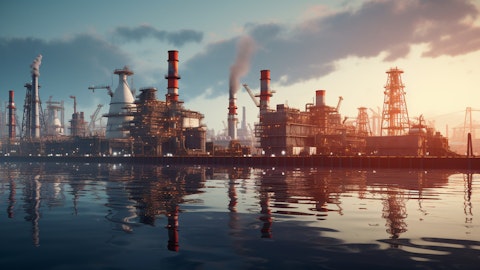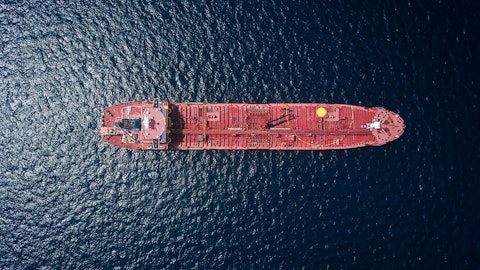And should we expect sort of like a sooner replacement of vessels versus what we’ve seen here over the past few years?
Kevin Mackay: Yes. No. I think, obviously scale provides us a lot of optionality to trade in different markets and be able to be in different places as the volatility that is inherent in strong markets plays out and we want to have enough scale to be able to play across several markets. So as we look at some of the older ships that we sold at the end of last year, we do currently hold a Suezmax and an Aframax for sale. Looking just to take value off the table for that older class of ship, if there is an opportunity to find a newer more modern vessel, yes, we would redeploy that capital to keep the exposure on. But we’re not looking at a set number or anything of that nature. It’s more around being able to distribute a large enough fleet across several markets to make sure that we can capitalize on the volatility that we expect to continue to see. So that’s really how we think about it, Omar.
Omar Nokta: Okay. Thanks. And how does [CCNs] play into that? Clearly, several quarters ago you brought in a good chunk of ships to take advantage and have that spot exposure that’s stabilized and that fleet hasn’t really grown. Is that an option or is it – do you prefer to do it via ownership?
Kevin Mackay: No, we have a lot of options. We’ve got a lot of tools in the toolkit. We’ve built a good in-charter book. We got in early before the market really took off and we’ve really enjoyed the added profit that fleet’s been able to provide. But we’re at a point in the market where there is a bid ask spread and it’s rather large at the moment between what other owners want for their ships and what we’re willing to pay. So you have seen us slow down that is a natural effect of the market reaching the sort of levels that we’re seeing. But that doesn’t preclude us from adding additional ships. It’s just finding the right ship at the right price often in the right location, which has a massive impact on your overall earnings.
We have several ships that will be coming off later as their charters roll off and we’ve already started discussions with the owners to see if we can find the number that’s equitable to both sides to keep those ships on. So it’s definitely a toolkit or a tool that we’ve got in the toolkit that we expect and are always looking to try and utilize. Similarly, I’ve been asked on previous calls as to whether we’d lock in our own ships at these kind of levels and put them out. And the answer is the same there. If we can find the right opportunity that pays the right price, we’ll certainly execute on it and be able to report on it.
Omar Nokta: Thank you for that, Kevin. And maybe just one more for me. Regarding TMX as you’ve been highlighting that the past couple of quarters, we’re getting closer and closer to that having an impact. And you mentioned the different potential trade lanes and the reverse lightering and whatnot. But maybe – are you able to give us maybe some perspective on how you think about that market developing? You highlighted how it’s in somewhat of a remote location relative to the normal trade lanes that Aframax will traffic in. How do you think that spot market develops for cargoes there in terms of kind of maybe enticing ships to stay there, since it’s kind of an isolated area at least relative to other areas? So I guess maybe how does the spot market play out there?
And I know that’s kind of trying to give some sort of crystal ball approach. But if not able to do that, maybe just in terms of what you’re seeing now in terms of what the rates offered in that region are versus where they are globally on average. Any kind of color you can give on pricing in that region?
Kevin Mackay: Well, first I think we’ve got to be honest. As we laid out in our presentation, it’s early days yet. The cargoes are starting to come. We’ve seen a couple of fixtures in the market from a positive standpoint for us. They seem to be long-haul both to China and then down to – 15 days down to Panama. So where the cargoes go? At this point, we don’t know. We have to wait and see. We think that there’s four main options that the customers will take. A lot will depend on oil pricing and the differences between oil prices in different regions, which again I’m not going to stand here and in any way try and predict that. What I do think will happen though is the oil will have to move and it will be priced into the right market and that will include shipping cost.
And if that means that ships in the far east have an option as they come into North Asia for discharge. They now have an option to look to ballast across to Vancouver and pick up a nice long haul voice from there. Similarly ships that do end up trading into the West Coast or through Panama, they now have that option to go up. So I think it’s something that owners will have to wait and see as the trades develop. I don’t think necessarily or mean that you will have ships that will station themselves there. I think they will move in from other regions as and when the requirements pick up. And from the freight standpoint, it will be priced according to the earnings that the owners expect versus relative to what they can do in other markets. But I think the real benefit we’re going to see is, is the additional ton miles specific to the Aframaxes.
Because the Aframax is the largest ship you could move into Vancouver. You can put in a smaller Panamax, but stem sizes are too big for a Panamax and you don’t have a lot of storage up in Vancouver. So the Aframax really is the vessel that this port needs to use. And I think whether it does go into the West Coast or to Light Ridge or Panama or to Asia, the Aframax is going to be the ship that’s going to have to service that. And it’s going to cause dislocation, it’s going to pull ships from the U.S. Gulf, it’s going to pull ships from Asia and that’s going to benefit. Possibly Suez Maxes and other Aframax in those regions as the supply diminishes.
Omar Nokta: Yes. It’ll be very interesting to see how it starts to develop here in the next few months. Well, thanks Kevin. I really appreciate that perspective.
Kevin Mackay: No worries. Thanks.
Operator: We’ll move next to Ken Hoexter with Bank of America. Your line is open. Please go ahead.
Ken Hoexter: Hey. Great. Good morning. And Kevin, I guess just to follow on that thought process, right? If we get those moving down into California, I guess then you’ll still have a product that needs to move than longer haul that replaces that, right, the product that California would’ve been told in you’d make up with even longer hauls?





